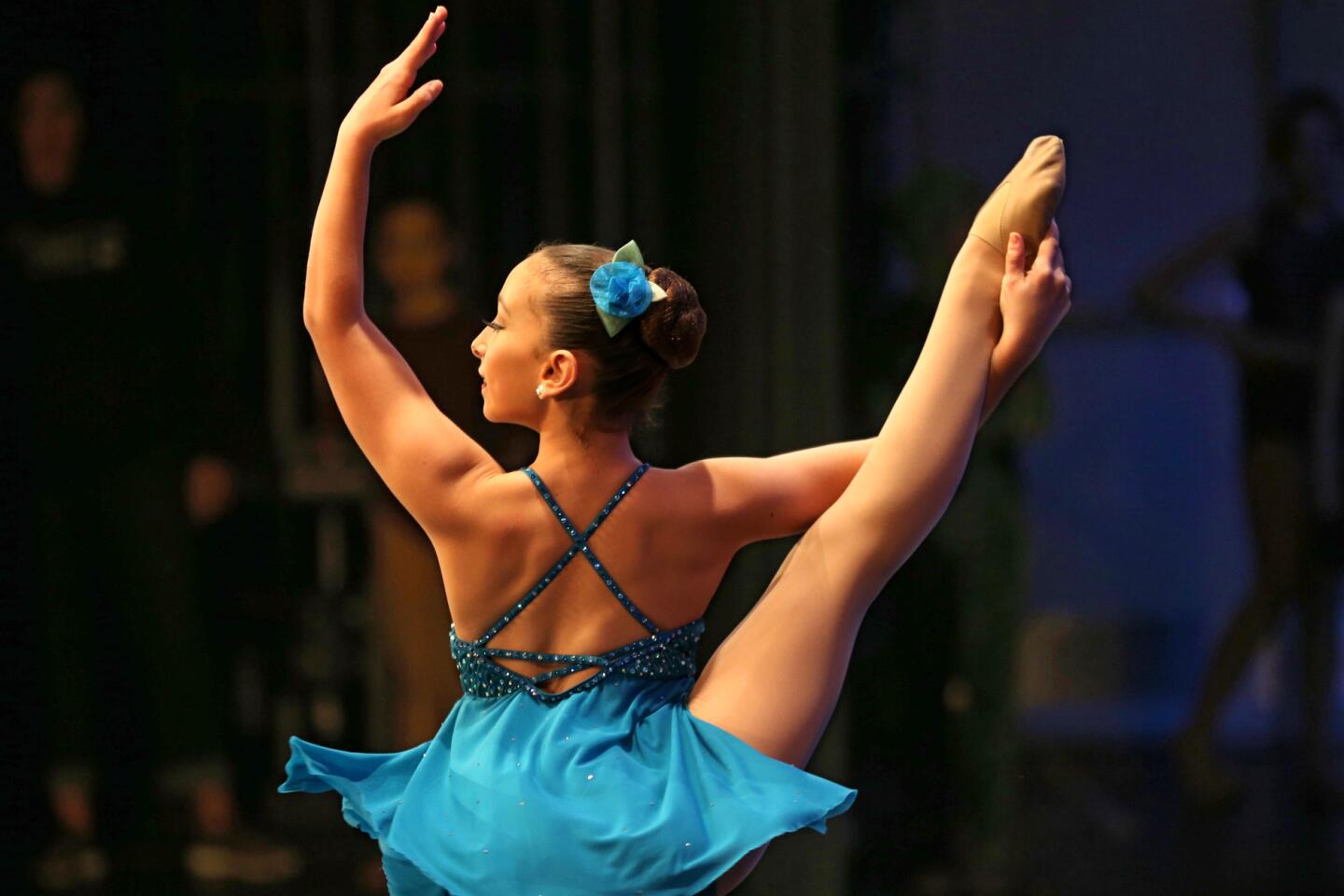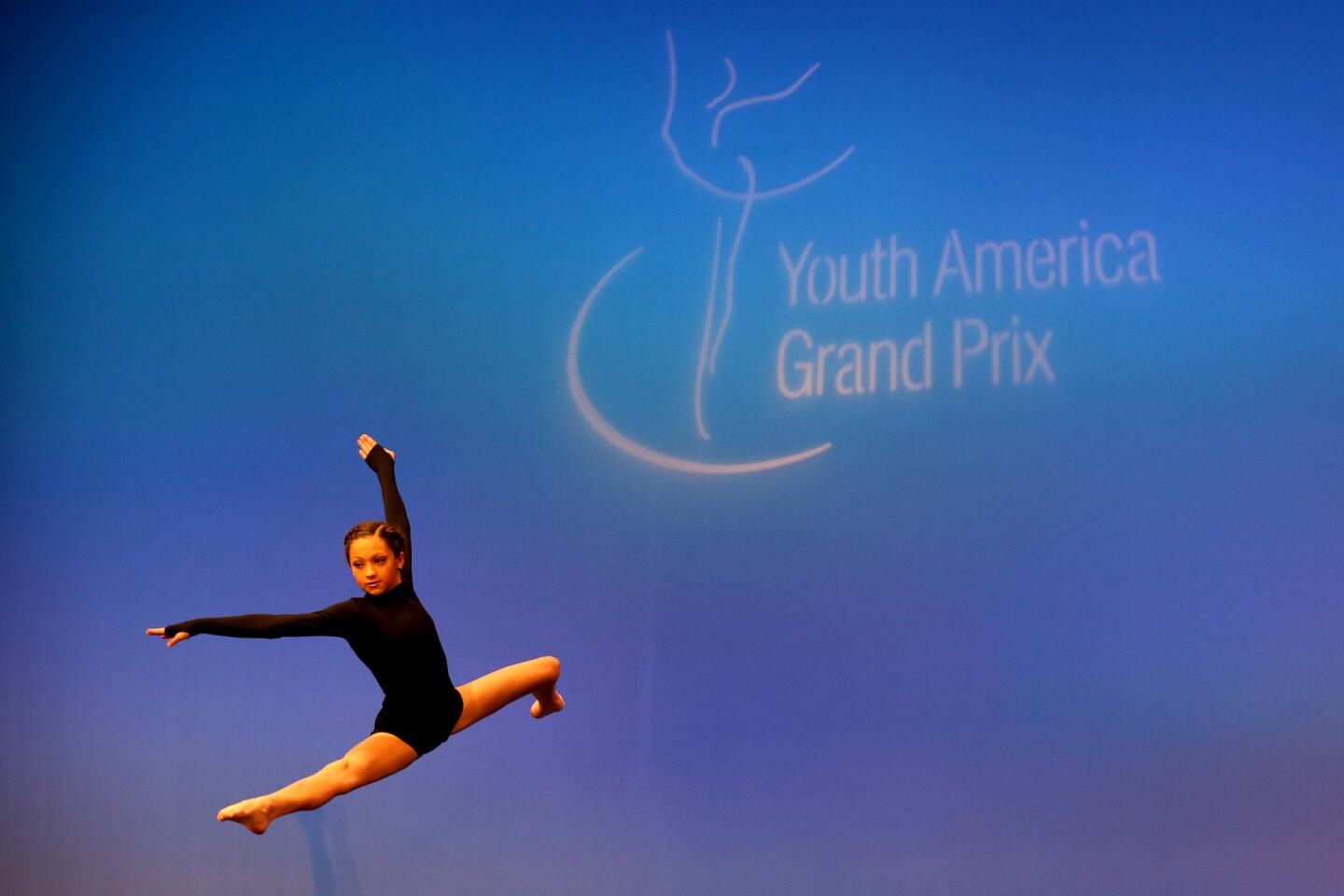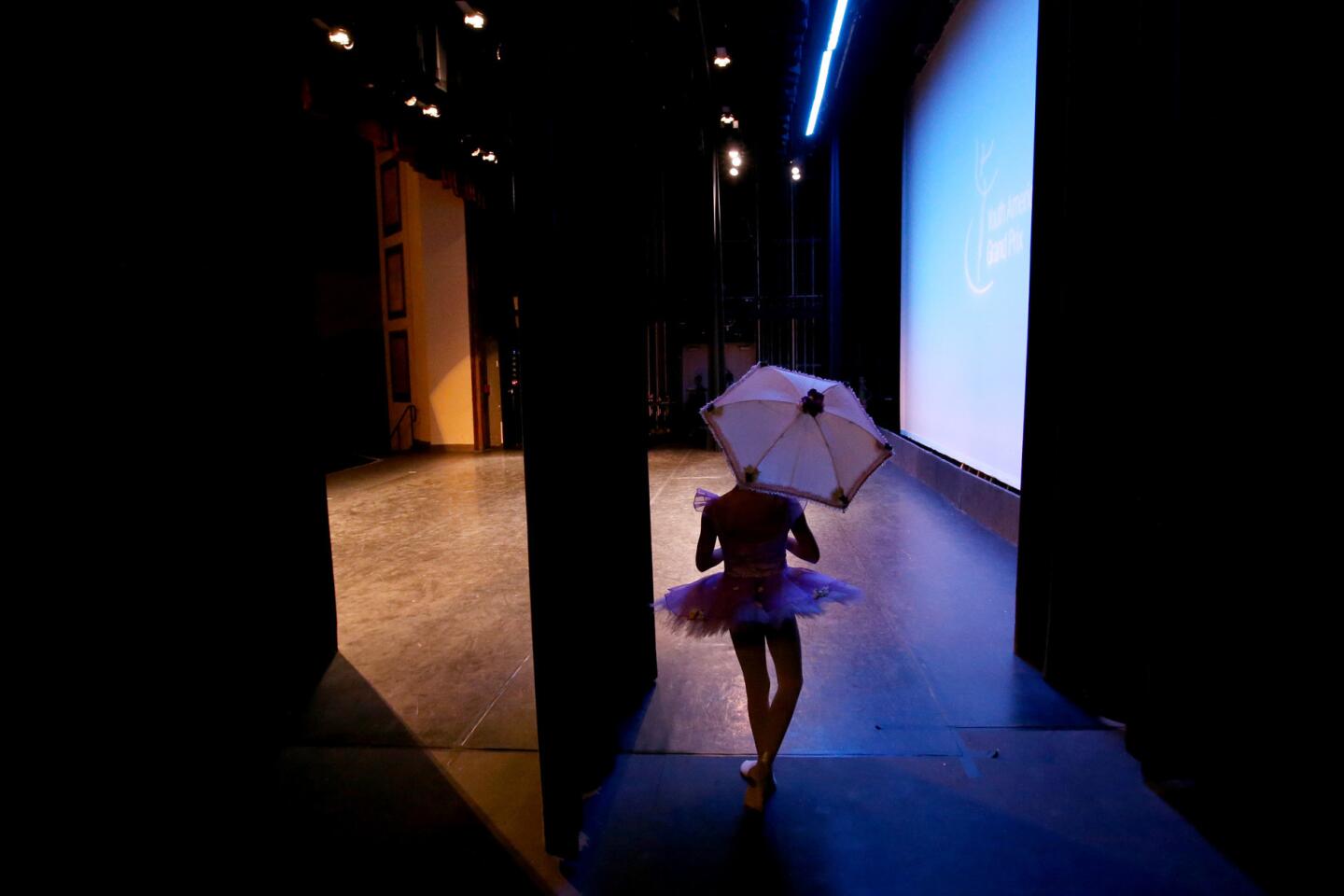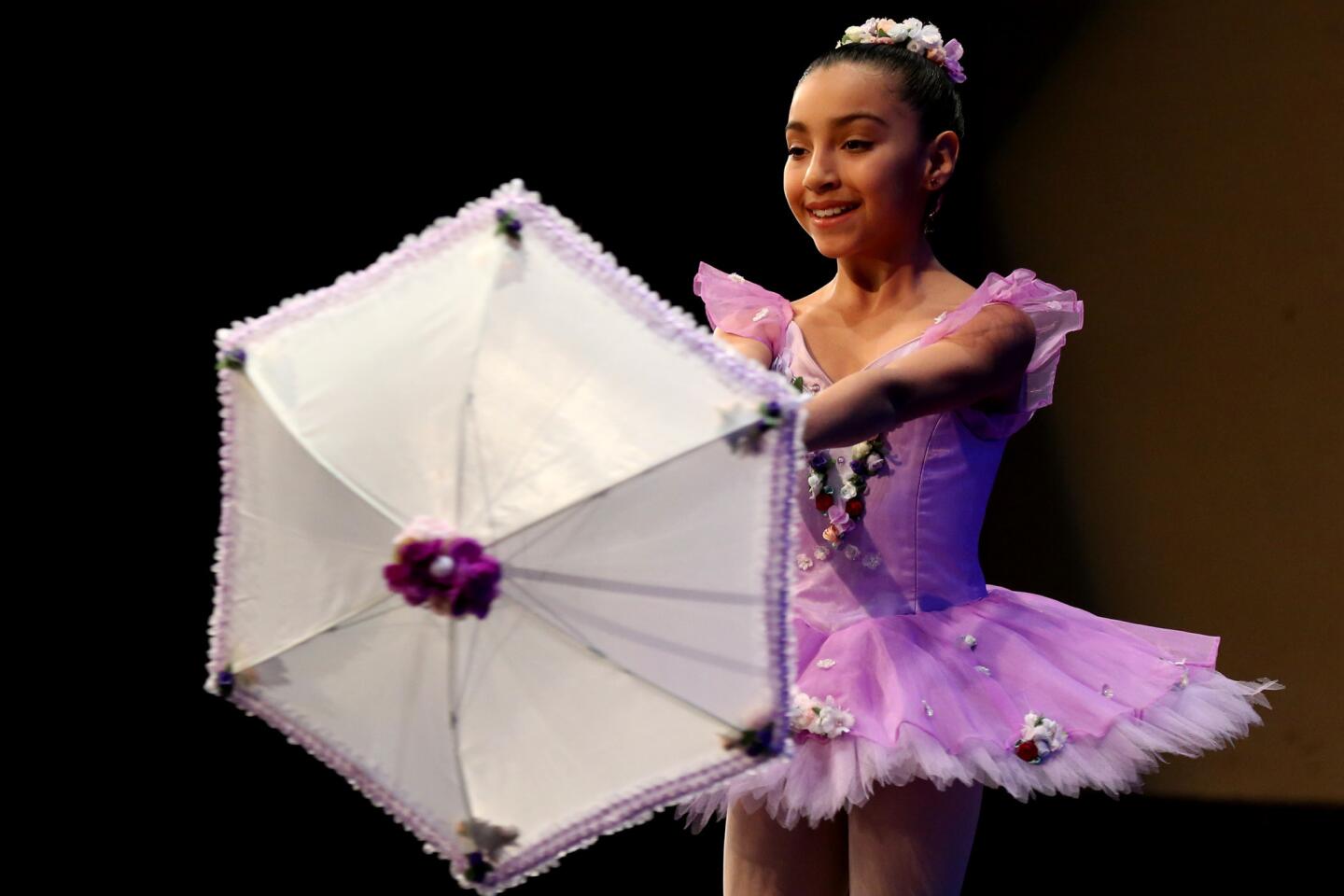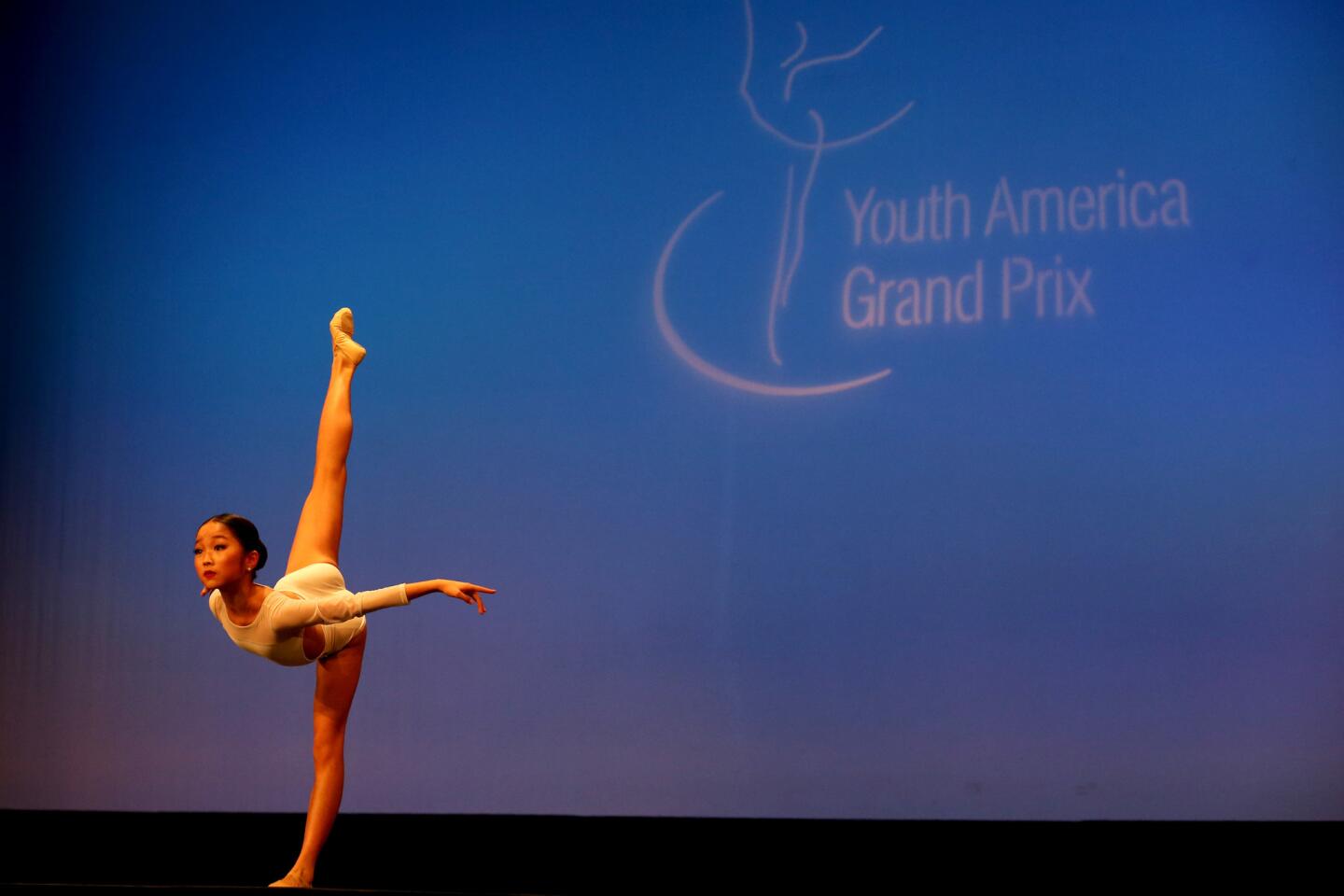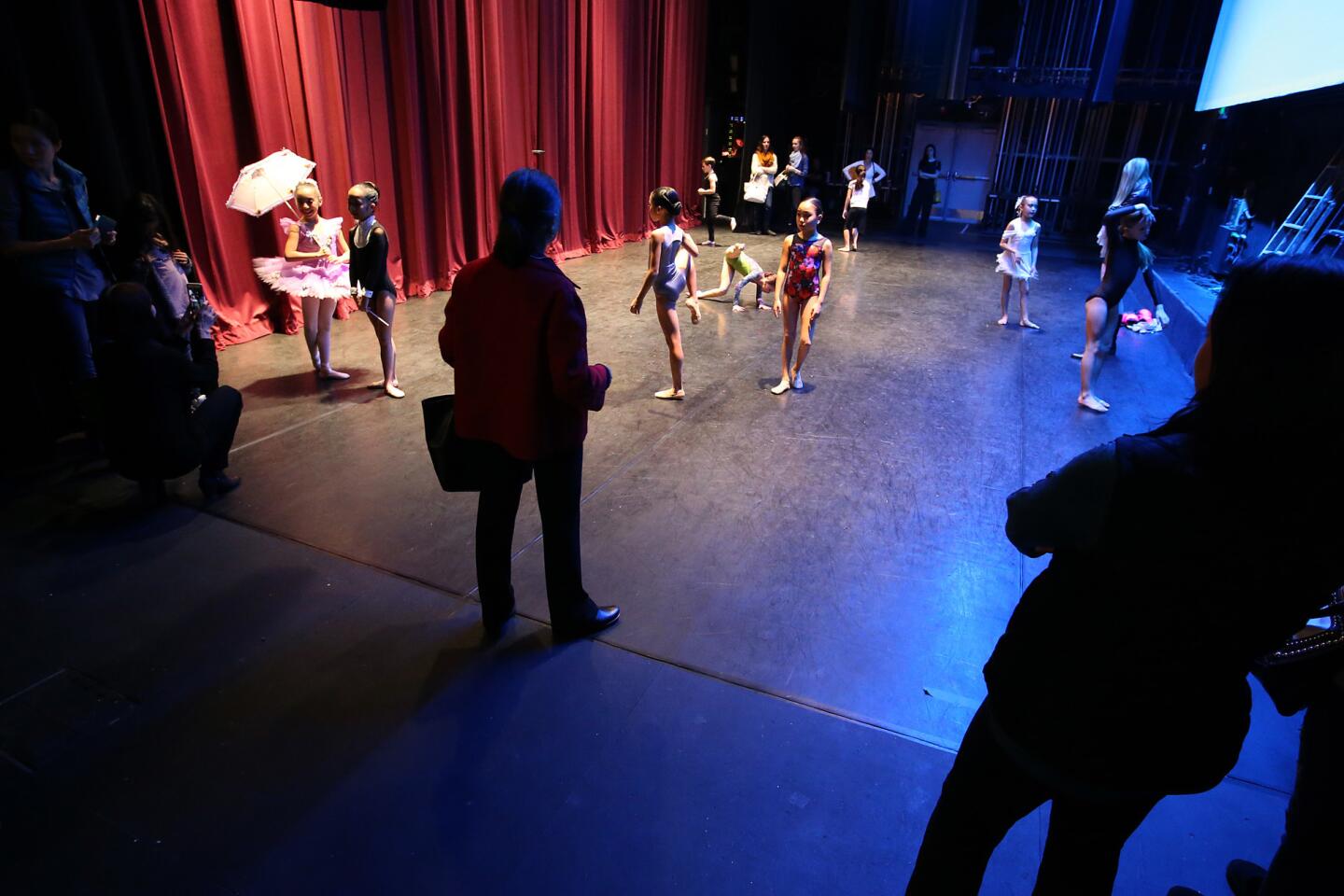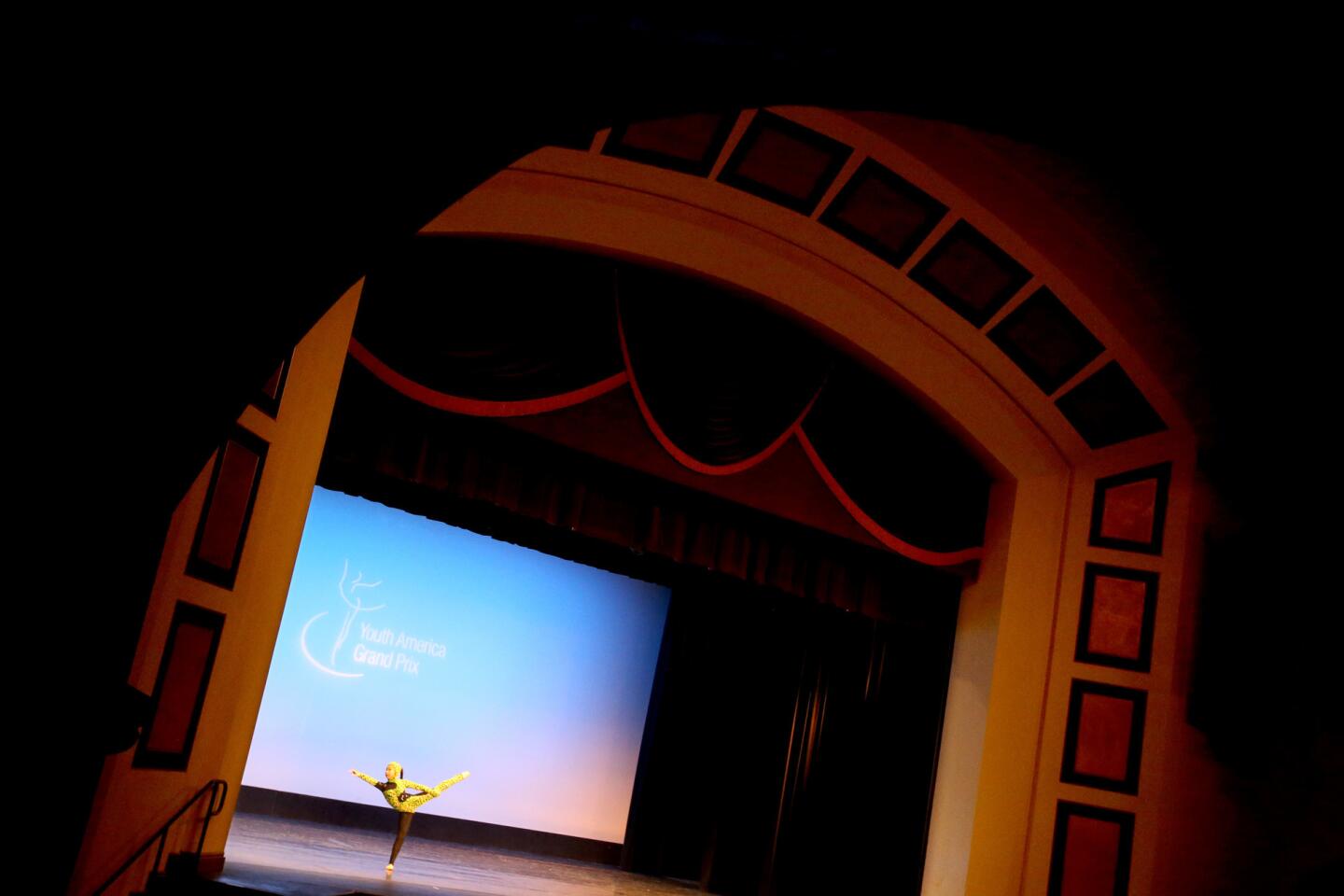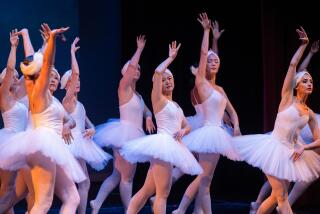This isn’t tutus and tiaras: The ballet Grand Prix draws young, driven competitors in droves
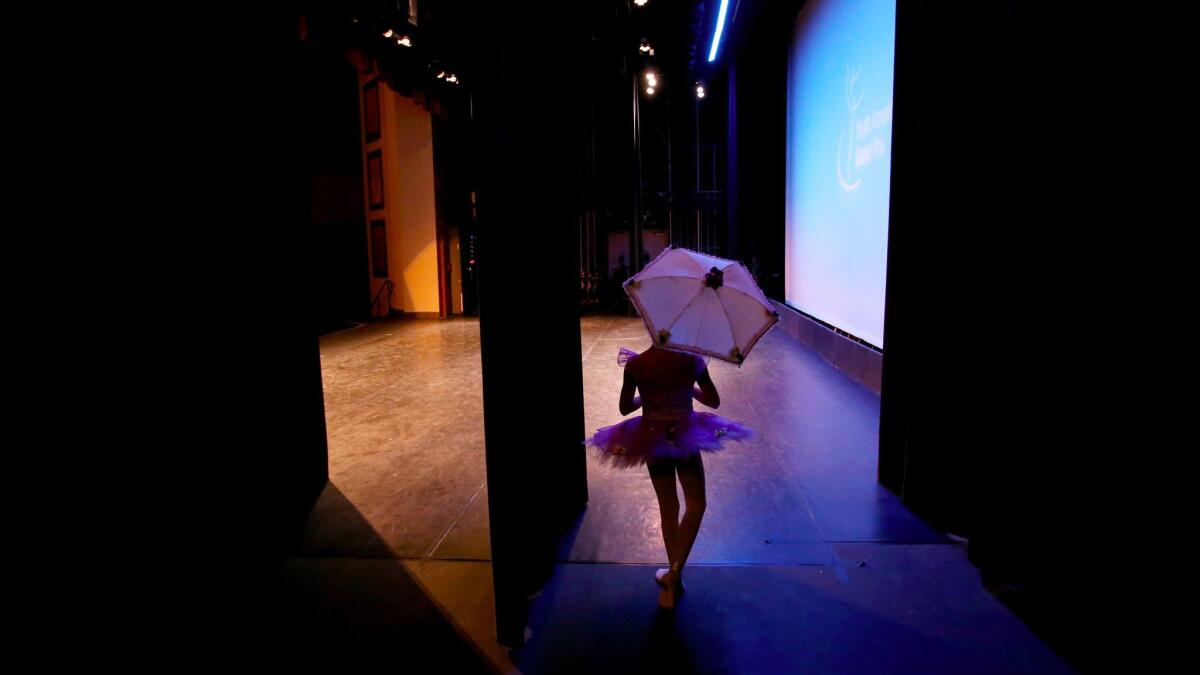
- Share via
The soap in the bathroom of the Huntington Beach High School auditorium is strawberry scented, but the main theater smells of raw ambition. This is the regional semifinals of what’s billed as the world’s largest student ballet scholarship competition: Youth America Grand Prix.
Thursday afternoon, children and teens begin to file in. They are mostly girls. Their hair is pulled back in buns so tight it cinches the skin at the temples. They wear ribbons and bows and tiny pearl-drop earrings. Nylon hoodies are draped over some shoulders, hot pink and blue warm-up booties on some feet.
These dancers dream of reaching the finals in New York City. Each year Youth America Grand Prix awards more than $250,000 in scholarships to send hopefuls to the top dance schools and companies around the world, including Alvin Ailey American Dance Theater and the Deutsche Oper Berlin.
“How’s it going, Bill?” one father in a pressed checkered shirt says to another waiting to sign in with his daughter.
“Oh, hey, I didn’t see you,” the other dad says, his eyes darting to his daughter with her serious hazel eyes. “Day dreaming,” he adds.
Everybody here, it seems, is dreaming. This isn’t tutus and tiaras. The competitors might be small in stature but they are large in heart and talent. About 400 of them, ages 9 to 19, will compete through Sunday. Similar competitions are going on in 26 cities in seven countries. The dancers are categorized by age, then each performs a short solo piece or ensemble for six judges who scribble intensely under the glow of a silver desk lamp.
Most of the time I just try my best to get it. If not, I’ll just try my best next time.
— Elise Cho, 10
Eight-year-old Aurora Kellogg is the first to perform in open stage pre-competitive contemporary group 1, which caps at age 10. She’s young, but an exception has been made for her to participate. Her piece is titled “Halo,” and she wears an angelic costume to match: a gauzy white skirt, lacy white top and glittering headpiece with diamond earrings. She is barefoot, her eyes are accentuated with thick black lashes, and her lips are painted cherry red.
Aurora sweeps and spins around the stage. She holds her right leg to her cheek while standing on her left. She does it deftly and seemingly without effort. She is thin and muscular, and she never stops smiling her pretty smile. The innocence, desire and drive on her face combines with the soft piano accompaniment to create tears in the eyes of the casual observer. May this sweet child never know the bitterness of disappointment.
She rushes offstage after her performance, breathless and proud. She began dancing at age 2, she says giddily. It’s what she has wanted to do for as long as she can remember. She has been practicing for this competition since last summer. She practices three to four hours a day.
Does she hope to win a scholarship? She glances at her mom, Camilla, who is also one of her dance coaches. “Yes!”
What would be her ideal destination or school?
She jumps, giggling with excitement.
“Anywhere!” she says, repeating for emphasis. “Anywhere!”
Aurora isn’t the only one here who practices hours a day. Most of the girls do. Three to four hours is the most common answer. The dancers say they balance their schoolwork by doing homework during lunchtime and at recess. One golden-haired ballerina confides that when she doesn’t finish her homework during the day, she has to do it while eating her dinner.
“Sometimes I don’t get the chance to eat,” she says.
This brings up the all-important question of stress for young bodies and minds when it comes to one of the most notoriously disciplined art forms. Is there too much pressure on the girls in this field?
Judge Brittany O’Connor, a principal dancer on tour with tenor Andrea Bocelli, says that can be difficult. O’Connor says she tries during the Youth America Grand Prix to get the young dancers to have the confidence to be themselves.
The problem with ballet, she says, is that when a girl starts to go pro, she’s standing in front of a mirror staring at herself in tights and a leotard for 10 hours a day.
“So you get stuck on what the girl next to you looks like,” she says. “She kicks her leg higher and she gets all the good roles.”
O’Connor, who is striking and slender in tight, ripped jeans and a smart leather jacket, says that she does her best to teach the children to love themselves and to own their flaws in order to make them shine.
The Youth America Grand Prix, which also runs classes and workshops, was founded 18 years ago by husband and wife Gennadi and Larissa Saveliev, former dancers for the Bolshoi Ballet in Moscow. The couple moved to New Jersey in 1995. After having a son, Larissa started teaching ballet. While looking for a way to stay involved in dance, she hit on the idea of a ballet competition.
The nonprofit organization has snowballed since then. To date it has awarded more than $3 million in scholarships to dance schools, and more than 70,000 students have participated in its international workshops and auditions. Three hundred and fifty alumni are dancing with more than 80 companies around the world.
A registration fee of $95 is required to compete, plus $45 per dancer in an ensemble or $100 for a solo act. This money goes toward running the organization and holding the auditions. The scholarships are provided by the schools and companies.
“Bolshoi in Russian means ‘big,’” Larissa says between harried cellphone calls as she rushes about the auditorium, managing just about everyone and everything. “My experience was amazing. I just want to give it back.”
Larissa seems to know every child by name, partly because many compete year after year.
Thirteen-year-old Anya Kulev is helping students from her parents’ ballet school in Laguna Hills compete, but she has been here before. She won a summer session in Connecticut with the Bolshoi Ballet. (She had fun but missed her parents.) She started ballet in a Mommy and Me class when she was a year old and loves ballet because it’s “the most beautiful art in the world.”
Ava Winer, 11, has become “very good at time management,” balancing an intense dance schedule with her schoolwork. So has Elise Cho, 10, who started dancing at 5, quit, and began again at age 8 because she realized ballet was “really pretty.” She tries to finish her homework quickly at school so she has time for dance at night, but she does so while “giving the right amount of effort, because grades do matter.” If she gets injured, her parents tell her, she will need to “have something else to do.”
Elise has competed before and says she hopes for a win, but she doesn’t count on it.
“Most of the time I just try my best to get it,” she says. “If not, I’ll just try my best next time.”
Onstage the dancers (all except a brave, soulful boy who you’d want to take out for hot chocolate and conversation) look like little women. They roll across the stage in waves, with strength and smoothed out angles. But offstage they are as small as their age would indicate.
One girl, out of her leotard, dressed in loose jeans and a warm-up jacket, scans the crowd for her mother after her performance. For a brief moment, she appears slightly panicked. But her eyes soon light up. She scurries down the row, burying her brightly made-up face and rosy red lips into waiting arms.
ALSO:
Benjamin Scheuer and a life told in heartbreaking song at the Geffen
Backstage with the smallest cast members of ‘The King and I’
Black dance legend, 85, has a message not all kids want to hear
Casting announced for national tour of ‘Hamilton’
2016 was a stellar year for women in theater, and yet...
More to Read
The biggest entertainment stories
Get our big stories about Hollywood, film, television, music, arts, culture and more right in your inbox as soon as they publish.
You may occasionally receive promotional content from the Los Angeles Times.
